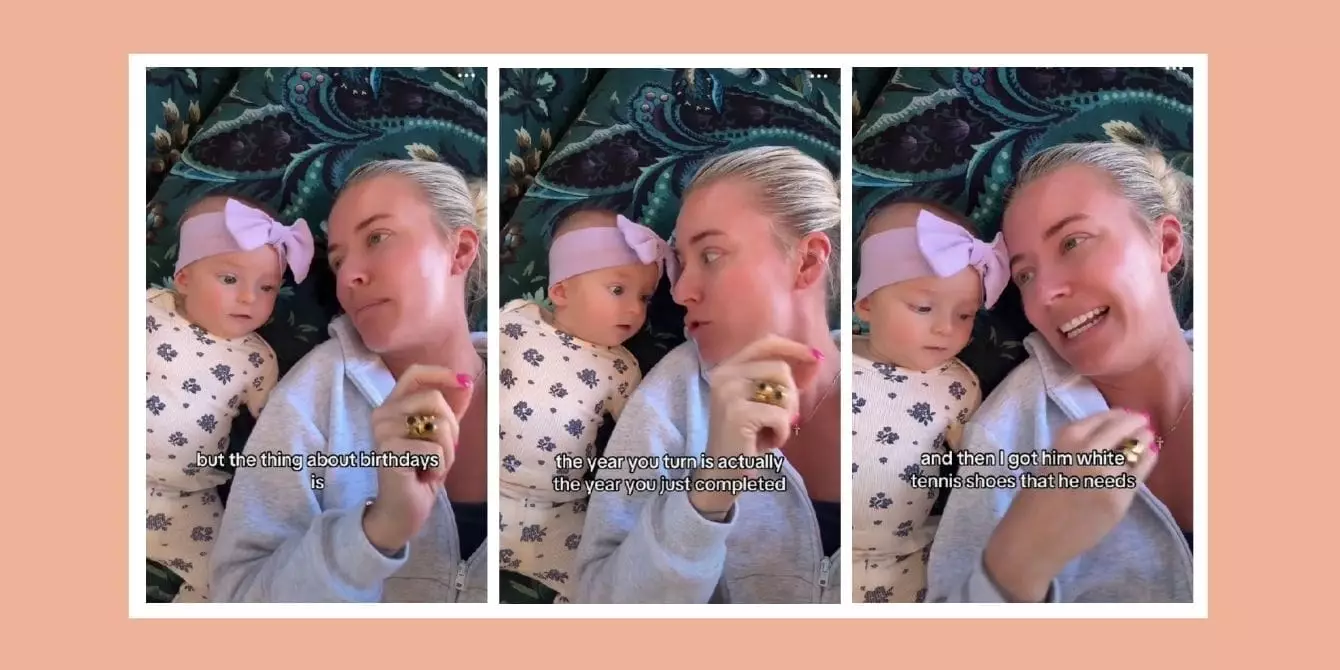In a world where parenting often gets coated in sugar and smiles, the approach taken by TikTok content creator Alex Bennett has injected a raw, refreshing dose of reality into the realm of new motherhood. Instead of resorting to the typical “baby talk”—you know, high-pitched voices and exaggerated coos—Bennett engages in what can best be described as a comical, almost therapeutic monologue aimed at her daughter. This style of communication strips away the fanciful embellishments typically associated with talking to babies, presenting a stream of consciousness that is as poignant as it is hilarious. The feedback from her legions of followers illustrates the immense appeal of this audacious style, with one video alone accumulating an astonishing 14.7 million views.
What’s behind the magnetism? It’s simple: authenticity. In less than a minute, viewers find themselves not just entertained but also enveloped in a dialogue that reveals understated joys and tribulations of motherhood. Whether discussing the nuances of a house tour or the stresses of daily life, Bennett’s delivery resonates with parents everywhere, sparking a collective nod of understanding. Her approach demonstrates that even the serious subjects can be cloaked in humor, making dark moments lighter and nurturing a shared community.
The Science of Speech Development
As delightful as this approach may be, it is not only entertaining; it also encapsulates scientific truths about language development in infancy. Traditional wisdom has focused on infant-directed speech—charming, melodic tones designed to capture a baby’s attention. However, recent research underscores that the narrative style Bennett employs yields its own advantages. By using a conversational format, she engages her daughter in a manner that promotes comprehension of routines and emotions.
The National Library of Medicine reveals that language-rich exchanges help heighten vocabulary development. The idea is that the quality and complexity of the words spoken to babies are just as important—if not more so—than the sheer volume of words they hear. Engaging in dialogue characterized by genuine emotional honesty, as Bennett does, teaches children the language of feelings, even when they may not grasp every sentence.
The Psychological Benefits for Parents
Even as Bennett cute-ly discusses mundane life events, the implications of this style of communication extend beyond just the child; they also address the frequently overlooked emotional health of new mothers. Early motherhood can be a lonely affair, filled with long days of solitude, frustratingly endless diaper changes, and unsolicited advice from well-meaning relatives. As a result, mothers often grapple with isolation, a phenomenon that new studies, like one published in BMC Pregnancy and Childbirth, have illustrated quite starkly.
The therapeutic nature of Bennett’s monologue is permission for mothers to express themselves freely. Speaking about personal trials—like the emotional fallout from an unfollow on social media—provides a platform for mothers to connect with their own experiences. In her light-hearted yet sincere delivery, Bennett makes a case for the necessity of “adult conversation” within the isolating confines of early motherhood. In doing so, she illustrates the profound connection between nurturing the child’s brain and advocating for the mental well-being of the parent.
Bridging the Gap Between Emotion and Language
Bennett’s narrative approach leans heavily on the emotional experiences of parenting, which is crucial for language acquisition. Language is not merely a tool for communication; it also serves as a vessel for sharing emotions. Through her commentary, Bennett is not only fostering her daughter’s cognitive development but also enriching her emotional intelligence. By giving her baby a window into the nuances of adult life—sharing anxieties, joys, and the mundane details of daily existence—she is cultivating a rich tapestry of language and emotional awareness.
Critics may argue that this method is subjective, serving more as a form of solace for the mother than a learning opportunity for the infant. However, the beauty of this approach lies in its inherent duality. When mothers engage authentically with their babies, they’re not just honing linguistic skills: they’re also creating a supportive, nurturing environment where emotions are valid and real.
In today’s fast-paced world, where parenting often feels hastily accomplished amid chaotic schedules, the benefits of talking to our baby with intent and humor cannot be understated. Rather than simply regarding communication as a means to an end, embracing a conversational style can yield unforeseen advantages, not just in intellectual growth for the child, but a profound restoration of connection and understanding for the parent, ultimately enriching both lives in the process.

